KANDAHAR, Afghanistan -- Muhammad Agha was shot multiple times while serving as a policeman in Afghanistan. Fourteen years ago he was beaten almost to the point of death for doing his job. Yet not once has he left the country whose people he has worked to protect for nearly three decades.
Today Lt. Col. Agha commands nearly 200 elite Afghan policemen who are helping to secure Highway 1, a road which cuts through Kandahar Province and feeds one of the country's primary economic hubs, Kandahar City. Less than one month ago, Kandahar's Provincial Governor, Tooryalai Wesa, toured the highway to showcase the progress made by Afghan security forces like Agha's 2nd Battalion, 3rd Afghan National Civil Order Police Brigade.
Agha is a calm but generous 47-year-old from Parwan Province. He is married, has six children and still lives in the home passed down by his father's father. Country is important to Agha. And the protection of Afghan citizens has been dear to him since he was a young student in high school.
EARLY YEARS
They were difficult and dangerous years, he said, and few schools were open when he was young. This was in the early 1980s. The Soviet army had come into Afghanistan, he explained, but the Afghan police still functioned and even protected the neighborhood around his school, located near what is now Bagram Air Field.
"When I was a school student," he said, "our high school was close to the district center. So when I would see the police they were very nice and very professional."
The demeanor and professionalism of those police had a lasting impact on Agha. At the age of 20, in 1983, he joined the Afghan police.
Over the years, that decision would earn him numerous enemies and cost him dearly in terms of physical pain. But it is a decision which Agha said he does not regret. He always wanted to be the kind and professional policeman, like those he knew as a youth in Parwan. Those police kept their poise, he said, even in the face of the Soviet army.
FRACTURED HISTORY
Keep in mind, Agha explained, that Afghanistan has had a rough and fractured history in the past 30 years.
"First there was Afghanistan. Then there were the (Soviets). Then the mujahideen, and now the Taliban," he explained.
"But I am not about ideology," he said. "My purpose has always been to protect as many people in Afghanistan as I can."
During Agha's police tenure he has worked with Americans, the mujahideen, the Afghan government, and because of his fluency with their language, even the Soviets.
But for everyone in Afghanistan with whom Agha has worked, there was always one group he could never stomach, he said. It is the same group that beat him to within an inch of his life: the Taliban.
The government was essentially dissolved at this time, he explained, and he was protecting his home village with policemen he'd known and trusted for more than a decade.
"Fourteen years ago, the Taliban came to our homes in Parwan and told everyone to leave," he said. "They came to our villages and spread word that they were taking over."
For more than two weeks in 1996, the Taliban left the villagers alone, Agha said. It was a move intended to convince citizens that the Taliban would respect their way of life and would not harm them.
"The 17 days of calm were meant to win us over," he said.
But once the 17 days passed, they were all forced out of their homes and subjected to the brutal and strict Taliban way of life. Those who resisted, like Agha, were beaten severely. But by that time the worst offense had already occurred, he said.
"It is very offensive to force an Afghan citizen out of their home without their consent," he explained.
In short, the Taliban made a lifelong enemy of policeman Muhammad Agha. For the next five years, he resisted Taliban rule with any and every Afghan policeman that would join him.
"The front lines of this battle happened where Bagram Air Field is now," he said. "During one attempted ambush, I was shot in my left hip protecting Afghans in Parwan."
Five years later, Agha said, he was recognized by the new government of President Hamid Karzai for his loyalty to the Afghan people. In 2001, he was promoted to police lieutenant colonel.
NEW GOVERNMENT, NEW LIFE
From his years in the 1980s as an entry-level policeman to his time as an ANCOP commander in Kandahar Province, Agha has been to every province and almost every district in Afghanistan. All the while, he said, his personal and professional philosophy has remained the same.
"I have tried to protect as many people of Afghanistan as I can," he said.
His latest mission as police commander has taken him to Kandahar Province, where tribal loyalties run deep, Agha said.
But he hopes those loyalties are not so deep that they cannot be overcome with the professionalism of his policemen.
"We've got an entire battalion of policemen coming into a district to provide security for a people none of them have ever met before, and many don't even speak the same language," said the U.S. Special Forces team leader whose detachment is partnered with Agha's battalion.
The majority of Agha's policemen are from provinces whose primary language is Dari. Kandahar residents, on the other hand, speak primarily Pashto.
"Yet the ANCOP come right in here and start talking to the kids like old friends, like they've always known each other," the team leader said.
So far they've been doing very well, he added.
None of Agha's policemen have left the ranks. They have lost no property and none of his men have even been seriously harmed. All of them still report to duty. It was only a year ago that ANCOP in some parts of Afghanistan had attrition rates of up to 80 percent, according to coalition reports.
"A lot of these guys don't even want to leave their checkpoints," said the Special Forces team leader. "They inherited these checkpoints from various other [Afghan National Security Forces] units while those guys retrain, and since the ANCOP have started working the checkpoints, they've beefed up the fortification with sandbags and dug-in trenches. They've basically adopted the checkpoints as their very own."
To judge by appearances, Agha's men are adopting the same model of policing which motivated him almost 30 years ago.
"They're a solid group of guys," said a Special Forces weapons sergeant working with Agha's men in Zhari District. "It's good stuff when you see them sitting down with the kids and the guys in a village they happen to be patrolling through that day."
"Of course, nothing is so perfect that it doesn't need fixing," he added. "But they're well on their way to operating independent of any partner force."
"At the end of the day, that's the ultimate goal," said the team leader.
"I know it's not feasible, but I wish that every [Afghan National Security Forces] unit could have the same partnership with Special Forces as we have had," Agha said. "We're really proud of them and they should be proud of themselves."
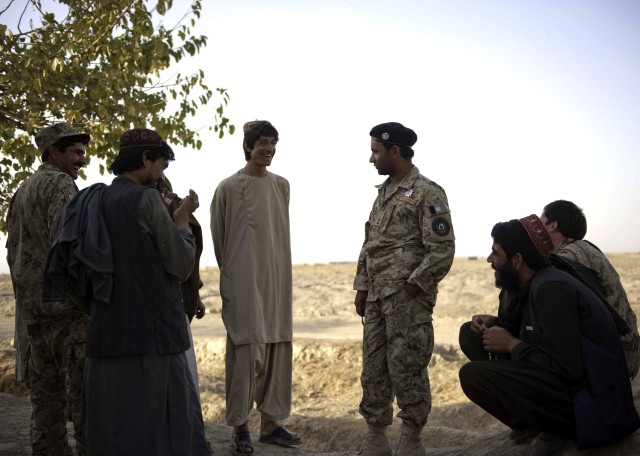
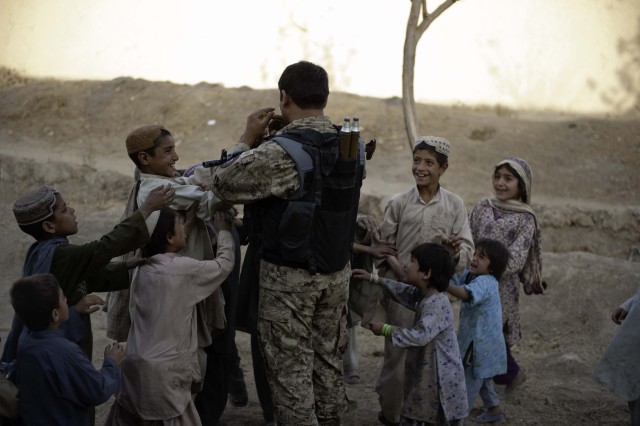
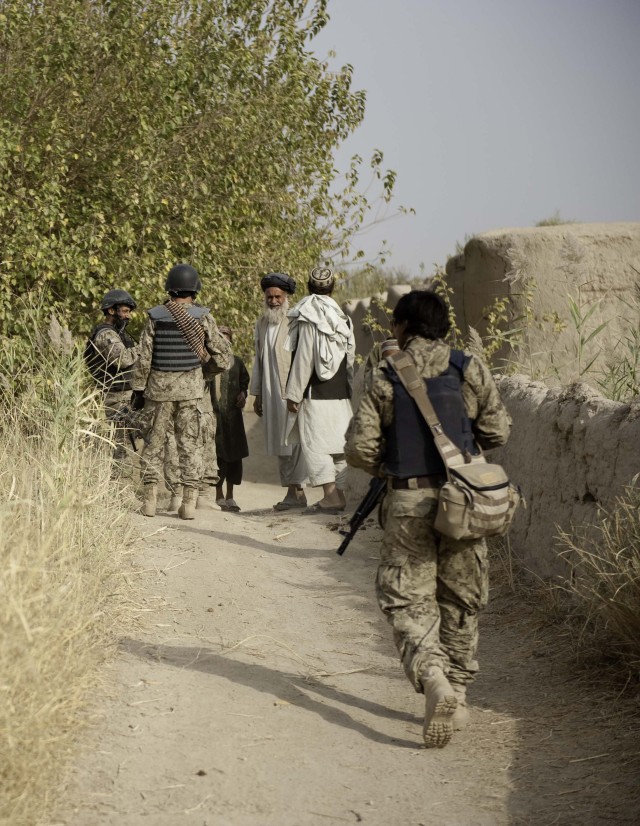
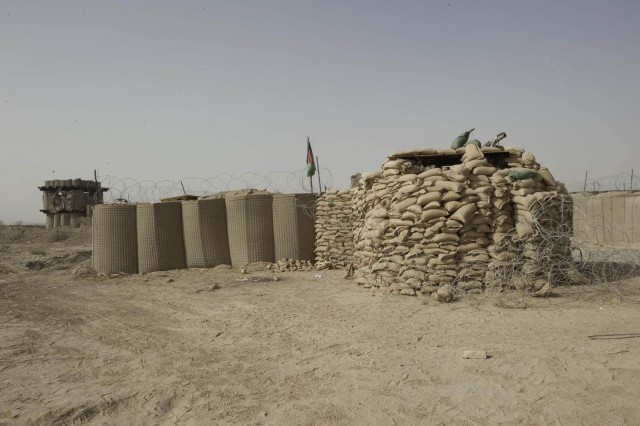
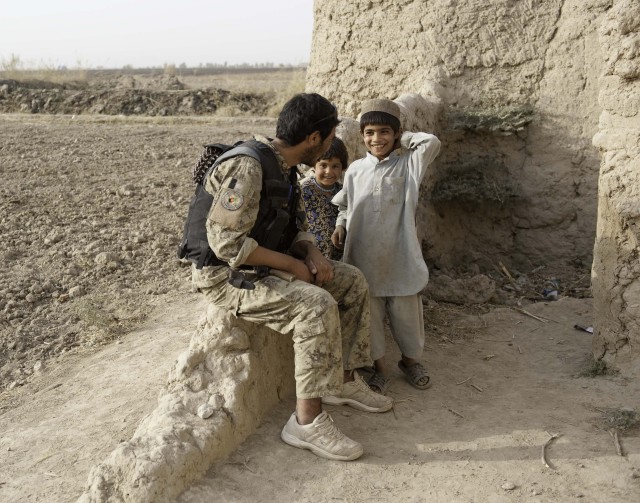





Social Sharing